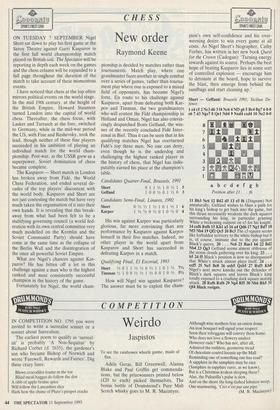SPAIN'S FINEST CAVA CHESS ,;©Dtaisali 411) ,
SPAIN'S FINEST CAVA
New order
Raymond Keene
ON TUESDAY 7 SEPTEMBER Nigel Short sat down to play his first game at the Savoy Theatre against Garri Kasparov in the first full world championship match played on British soil. The Spectator will be reporting in depth each week on the games and the chess column will be expanded to a full page throughout the duration of the match to take account of these momentous events.
I have noticed that chess at the top often mirrors political events on the world stage. In the mid 19th century, at the height of the British Empire, Howard Staunton turned London into the capital of world chess. Thereafter, the chess focus, with Lasker and Tarrasch at the fore, switched to Germany, while in the mid-war period the US, with Fine and Reshevsky, took the lead, though neither of these fine players succeeded in his ambition of playing an individual match for the world cham- pionship. Post-war, as the USSR grew as a superpower, Soviet domination of chess became complete.
The Kasparov — Short match in London has broken away from Fide, the World Chess Federation, and ended several de- cades of the top players' discontent with the world body. Kasparov and Short are not just contesting the match but have very much taken the organisation of it into their own hands. It is revealing that this break- away from what had been felt to be a stultifying governing council (a world fed- eration with its own central committee very much modelled on the Kremlin and the Soviet Communist Party) should have come at the same time as the collapse of the Berlin Wall and the disintegration of the once all-powerful Soviet Empire.
What are Nigel's chances against Kas- parov? He has bitten off a lot in this challenge against a man who is the highest ranked and most consistently successful champion in the history of the game.
Fortunately for Nigel, the world cham- pionship is decided by matches rather than tournaments. Match play, where one grandmaster faces another in single combat over a series of games, rather than tourna- ment play where one is exposed to a mixed field of opponents, has become Nigel's forte. En route to his challenge against Kasparov, apart from defeating both Kar- pov and Timman, the two grandmasters who will contest the Fide championship in Holland and Oman, Nigel has also convin- cingly despatched Boris Gelfand, the win- ner of the recently concluded Fide Inter- zonal in Biel. Thus it can be seen that in his qualifying matches Nigel has overturned Fide's top three men. No one can deny, even though he is the underdog and challenging the highest ranked player in the history of chess, that Nigel has indis- putably earned his place at the champion's table.
Candidates Quarter-Final, Brussels, 1991 Short 0 1 1 1/2 1 0 1/2 1 5 Gelfand 1 0 0 1/2 0 1 1/2 0 3 Candidates Semi-Final, Linares, 1992 Short 0 1/2 1/2 1/ 1 0 1 1/2 1 6 Karpov 1 1/2 1/2 0/ 0 1 0 1/2 0 4 His win against Karpov was particularly glorious, far more convincing than any performance by Kasparov against Karpov himself in their five matches. Indeed, no other player in the world apart from Kasparov and Short has succeeded in defeating Karpov in a match.
Qualifying Final, El Escorial, 1993
Short 1/2 0 1 1
1/2 1/2 0 1/2 1 1 0 1 1/2 71/2
Timman 1/2 100 1/21/21 1/200101/2
51/2 How will Nigel win against Kasparov? The answer must be to exploit the cham-
pion's own self-confidence and his over- weening desire to win every game at all costs. As Nigel Short's biographer, Cathy Forbes, has written in her new book Quest for the Crown (Cadogan): 'Turning energy inwards against its source. Perhaps the best hope of beating Kasparov lies in some sort of controlled explosion — encourage him to detonate at the board, hope to survive the blast, then emerge from behind the sandbags and start cleaning up.'
Short — Gelfand: Brussels 1991; Sicilian De- fence.
1 e4 c5 2 Nc3 d6 3 f4 Nc6 4 Nf3 g6 5 Bc4 Bg7 6 0-0 e6 7 d3 Nge7 8 Qel Nd4 9 Nxd4 cxd4 10 Net 0-0 Position after 13 . . . f6
11 Bb3 Nc6 12 Bd2 d5 13 e5 f6 (Diagram) Not unnaturally, Gelfand wishes to blast a path for his king's bishop to get back into the game, but this thrust necessarily weakens the dark squares surrounding his king, in particular granting White a beckoning outpost on e5 for his knight. 14 exf6 Bxf6 15 Khl a5 16 a4 Qd6 17 Ngl Bd7 18 Nf3 Nb4 19 Q12 Qc5 20 Bc3 The c3 square seems like forbidden territory to the white bishop but it is, of course, immune due to the pin against Black's queen. 20 . . . Nc6 21 Rael b6 22 Bd2 Nb4 23 Qg3 Gelfand seems almost oblivious of the storm clouds gathering over his king. 23 . . • b5 24 f5 Black's position is now so disorganised that White's attack almostplays itself. 24 . . • exf5 25 Ne5 Be8 26 axb5 Qxb5 27 RxfS Kh8 Nigel's next move knocks out the defender of Black's dark squares and leaves Black's king totally exposed to a crushing dark square mating attack. 28 Rxf6 Rxf6 29 Ng4 Rf5 30 Nh6 Rh5 31 Qf4 Black resigns.


















































 Previous page
Previous page